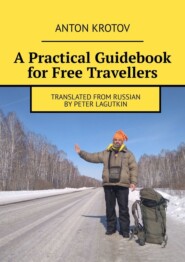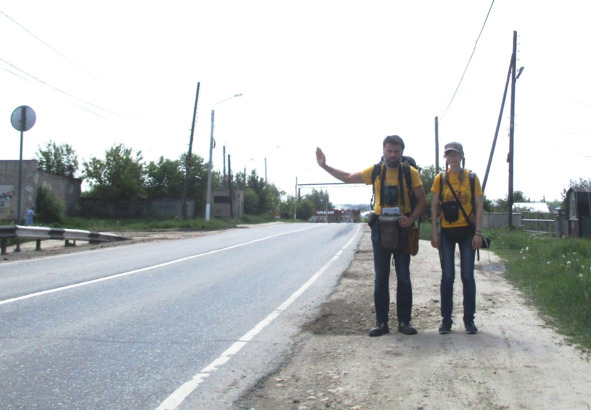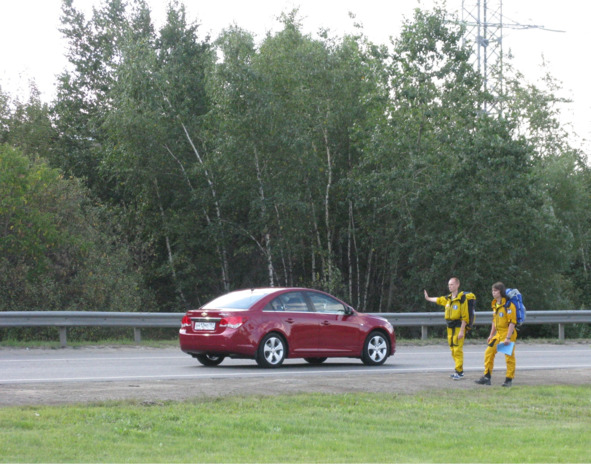
Полная версия:
A Practical Guidebook for Free Travellers. Translated from Russian by Peter Lagutkin

A Practical Guidebook for Free Travellers
Translated from Russian by Peter Lagutkin
Anton Krotov
Translator Peter Lagutkin
Illustrator Anton Krotov
© Anton Krotov, 2021
© Peter Lagutkin, translation, 2021
© Anton Krotov, illustrations, 2021
ISBN 978-5-0053-7561-2
Created with Ridero smart publishing system
Introduction
Hitch-hiking started in the West with the advent of the car and became a popular method of travelling, but later was disregarded as supposedly dangerous and inefficient. But recently, beginning in the 1990s, hitch-hiking gained quick popularity in Russia and other post-Soviet countries, and it was the book you are holding in your hands that started this revolution. At this moment, hundreds of Russian hitch-hikers are exploring some of the remotest corners of this planet in the name of «the science of travelling,» an elaborate yet humorous system built around two cornerstone beliefs: first, that the world is kind to you and full of help, and, second, that all relevant information should be organised systematically and shared for others to use. Tens of thousands of people, after reading this book, were inspired to go on the road and set out for the big world – lying out there waiting to be discovered.
About This Book
I made a hundred trial copies in the spring of 1995 and peddled them on the famous pedestrian street in the centre of Moscow, the Arbat. The book was well received and sold well. In the following years (1995 to 2010), I made eight editions, gradually updating the book’s contents. It became known by its abbreviated Russian name, PVP (native pronunciation: peh-veh-peh), and it helped tens of thousands of people to discover the world. The book became a classic and sold over 140,000 copies.
Meanwhile, the surrounding world was changing. The internet and cellular phones appeared; a veritable «information revolution» occurred; working in Russia pays very considerably better in the 2010s than in the «hungry» 1990s. Some methods of travelling or communication, in demand at that time, now appear too difficult or completely irrelevant. New editions of this book are updated in accordance with how our time, and our country, changes. However, the general message and the general applicability of this book remain unchanged.
This book will teach you how to reach any city or town in Russia, how to get back home, how to cross the entire country if necessary (even if you don’t have one rouble of your own!), and how to travel in other countries. You will learn to find a place to sleep in any city, town, or village, even if you don’t know anybody there (yet). You will learn to deal with the drivers, the law, the locals, and your own parents. You will understand how to treat other people and the world if you want such travels to bring you joy.
All the methods I describe have been tested out in practice; moreover, they were born from practice. This book generalises collective experience of many and many free travellers, and I hope this experience will be of use to you.
I will gladly accept feedback and suggestions. Write me email at krotov_avp@mail.ru (I can read and answer in English). For my travelling news and upcoming events announcements, visit my blog at http://a-krotov.livejournal.com (Russian only).
About The «Free Travellers»
(instead of a translator’s foreword)
A free traveller is an original concept introduced by Anton Krotov, defined by him as traveller who spends half or more of his or her travelling time in the company of people who are NOT employed to be his or her company. According to Anton, the world is kind to you and full of help, and every sequence of events is correct; if a sequence of events you’re observing seems to be wrong, you haven’t watched it to the end. Because of all that, Anton’s teaching goes, one needs no paid help from tour agencies or touts; the world is there for everyone who has thought about it once, and so all help one might need will come from the world brotherhood in exchange for the little the world needs from you, or nothing. Free exchange of help is essential; hitch-hiking isn’t freeloading, Anton insists, and he urges you to share as much of the comfort you enjoy while at home as you can with the needy (travellers included) whom you might meet in the streets of your own cosy city, or the doors of your own cosy home.
Anton freely uses the concept «free travelling,» but I (the translator) chose to steer clear of it as, quite obviously, he means it as in «free of restrictions,» not as in «free of charge.» Once again: hitch-hiking isn’t freeloading; and being a free traveller (or simply a free person) certainly doesn’t mean always travelling (or simply getting stuff) for free!
Peter LagutkinThe Author’s Foreword
Every one of us knows this feeling when you want to peek beyond the horizon and see other cities and faraway countries – not on the TV screen.
I first tried travelling when I was 15, using the once-great network of suburban train services covering large portions of ex-Soviet territory. How exciting it was to get off at the end of the route and hop on another train, then another… I could set out from Moscow and reach St. Pete, Kiev, or Minsk if I wanted!
The second discovery I made was hitch-hiking. It turned out that some of the cars I saw driving down the road could actually pick me up and want nothing in exchange. In the course of several years I visited most of the former USSR territory – from Yerevan to Magadan, and then went on to visit some more countries, with warmer weather, and longer distances, involved. I tried hitch-hiking in India, China, the Arab world, many African countries, and I was ever assured of the helpfulness and kindness of the surrounding world; I was assured that the methods of getting lifts, food, and shelter available in my country could be applied nearly everywhere. Yes, you can go to any city in Russia, or anywhere else on the Eurasian continent, or to Africa, and even if your purse is thin, but you know how to love and understand the surrounding world – it will be open for you, drivers will stop their cars for you, local residents will invite you to their homes, everyone will be your brother, and all planet Earth will be your home.

Anton Krotov
American Friend’s Note
Russian hitch-hikers are a unique breed of travellers that have much to teach. They have proven time and again that the only necessity to travel literally across the world is the ability to connect and relate with locals. In 2005 I met with hundreds of Russian travellers who taught me much about the world and it was with this inspiration, coupled with my intrinsic desire to understand humanity, that I embarked on a 21-month travel through 27 countries of Asia, former Soviet Union and Europe. After returning home, I must say that Anton is truthful when he teaches that humanity is a hospitable and kind brotherhood and that the world is plentiful.
Brandon Gottung. Madison, WI, USAHitch-Hiking
Hitch-hiking (Russian: автостоп, pronounced off-toss-top) means getting free lifts from passing vehicles. There are two common misconceptions about hitch-hiking. One goes: «there are no free rides nowadays» (or: «who’s gonna pick you up for nothing?»). The other one is to the effect of, «it is pure luck when you get just the lift you needed,» or «you never know when you get there.» The good news is, both have been proven wrong by numerous hitch-hikers (myself included). Believe it or not, we get lifts (from cars and lorries), don’t pay (and aren’t expected to), and, to boot, when we hitch-hike, we can control the process.

Hitch-hiking (Anton Krotov and Katerina Boyarova)
Moreover, many patterns we notice while hitch-hiking in Russia work all the same in the other ex-Soviet states, in Eurasia, in Africa, and just about everywhere. You yourself can try this out when you want to.
Like all other things people do, hitch-hiking can be done either consistently («professionally’) – or spontaneously, or out of need, or casually. «Spontaneous» hitch-hiking without any rules or methods emerged in the first decades of the 20th century, with the advent of motor transport. In our time, people often flag down a passing car to get somewhere, sometimes for free, but not many of them know that information about hitch-hiking can be systematised in a certain way, turning it into a robust, comprehensive travelling method.
Having mastered the methods of hitch-hiking, one can cover about 500 to 600km (or about 350mi) in ten hours (in the daytime, sticking to major roads). For example, you can set out from Moscow and reach St. Petersburg or Minsk on the same day – or you can spend 24 hours on the road and reach Petrozavodsk, or Samara, or Brest (Byelorussia), or Rostov-on-Don, with no fares to pay or train schedules to keep in mind, sometimes faster than the train. Finally, your journey will be more of a lesson, teaching you things you would never have learnt in other ways – and letting you feel the genuine taste of the road experience.
The Teaching Of Hitch-Hiking
There’s more than one school of hitch-hiking thought in Russia; the oldest one styles itself (in clumsy English) Petersburg AutoStop League (or PASL; a better translation would be St. Petersburg League of Hitch-Hiking, and the Russian acronym is PLAS, pronounced PLAHS). It was founded in 1978 by Aleksey Vorov who has hitch-hiked more than 1,850,000km, or 1,150,000mi, setting an unsurpassed record.
Aleksey Vorov has spent many years training people in competitive hitch-hiking, which means more than getting lifts – it means trying to get the fastest lifts possible and outrace your rivals. To achieve this, PASL members stage lectures and even hitch-hiking races; they design, make, and use special equipment. A qualified PASL member can advance around 1,100 to 1,400km in 24 hours (in summer time, sticking to Russia’s major roads) in the day or in the night if he or she wishes so. You can easily recognise PASL members on the road by their characteristic, striking yellow overalls.
The author of this book has had the privilege to learn a lot while talking to Aleksey Vorov and some of his followers.

PASL hitchhikres
PASL’s biggest achievement was their 1992—1993 round-the-world hitch-hiking expedition they called AutoColumb («Car Columbus»). Its participants hitch-hiked around the world and never used any regular public transportation. They crossed 25 countries of Eurasia, North and South America, and that at the time when we ourselves didn’t even dream of such adventures. PASL is a somewhat secretive organisation; they are very poorly represented on the internet.
The second hitch-hiking school in Russia is actually called Moscow School of Hitch-Hiking (also known by its Russian acronym MShA, pronounced m-shah). It was founded in 1994 by Moscow hitch-hiker Valery Shanin. In the same year he published his book, entitled Hitch-Hiking: Free Lifts in the US and Europe (the original titular word is actually transcribed from English word and sounds pretty alien to many Russians; the more common word avtostop is included in the subtitle for explanation), still in print (as of 2014).
In the 1990s, Valery and his followers travelled all around Europe (sometimes with visas, sometimes without). The following decade saw Valery and the others switch focus to other continents. He travelled around the world several times (not by «pure» hitch-hiking) and authored some twenty guide-books and another fun-to-read book, Around the World for $280. More light used to be shed on Shanin’s deeds on his club’s web-page, but it is now defunct.
Of course, there were many lonewolf hitch-hikers in Russia, collectively possessing vast, yet unsystematised (hence, unusable) pool of experience; probably the earliest group of people to practice hitch-hiking regularly were the hippies. In recent years, more and more stories from such people surface on the internet. This book originated as an attempt to summarise the experience of a great number of hitch-hikers.
In 1995, yet another hitch-hiking school appeared in Moscow, called Academy of Free Travellers (the Russian acronym is AVP, pronounced ah-veh-peh) and founded by the author of this book. Our two purposes were, and still are: to make what we do a more popular practice and to gather and spread valuable information. Some of us write books. One of those is in your hands now.
We have organised 25 major expeditions and many more smaller trips and hikes. AVP sages (those who’ve made exceptional contributions to the common cause with their experience and wisdom) have visited every administrative division of Russia and all ex-Soviet states – and a good hundred other countries. We were the first Russians to hitch-hike to Iran, Pakistan, and India. We have hitch-hiked across Africa – from Egypt and Sudan to Namibia and Angola. And we still have time for our unique project, «House for Everyone,» which means that, somewhere in the world, we temporarily rent a house (or flat) and offer any sober and discreet traveller free shelter, food, and company. We have opened (and closed already) such Houses in Irkutsk (Siberia; 2006), Osh (Kyrgyzstan; 2007), Cairo (Egypt; 2008), Vladivostok (Russia’s Far East; 2009), Arkhangelsk (Russia’s North; 2009—2010), Dushanbe (Tajikistan; 2010), Istanbul (Turkey; 2012; we did it instead of Damascus because of the war), Krasnoyarsk (Siberia; 2012), Kunming (China; 2012—2013), Mexico City (2012—2013), and Antananarivo (Madagascar; 2013—2014), and as this translation is being prepared, we ourselves are preparing to open three more consecutive houses in Sevastopol (the Crimea; we had to cancel the house in Lvov due to travelling restrictions in Ukraine), Berlin (Germany), and Yogyakarta (Indonesia). Every June, we hold weekend-long Sober Outdoor Gatherings (in a forested area outside Moscow, and yes, alcohol and drugs are strictly prohibited) where some of the most interesting travelling stories are told in the form of lectures. We have organised about one hundred hikes (always off the beaten tourists’ track, sometimes quite taxing physically). And we do a lot more stuff.
For more about our adventures, read the many books by Anton Krotov (yes – all in Russian… with translations NOT expected soon) or simply google his name. Our lectures, gatherings, meetings, and hikes are open for everyone.
There are other hitch-hiking clubs across ex-USSR, but most of them show no signs of productive activity.
Planning Your Trip
Before setting out, a hitch-hiker must know where he’s going – not just what cities lie on the way but also which roads will have to be used. Of all possible routes from one city to another – the shortest is not necessarily the fastest! Traffic, average speed, driving patterns, road condition vary greatly from highway to highway. Some roads are convenient for hitch-hiking, some are not, and others still can be found on your map but don’t exist in reality.
Roadwork is slowly improving in Russia, and a physically impassable major highway is largely a thing of the past. Arteries connecting Russia’s main cities and marked with the letter M in Russian atlases (such as M-5 from Moscow to Chelyabinsk, or M-18 from St. Petersburg to Murmansk) are all suitable for hitch-hiking, with much traffic round the clock and in every season.
Other roads, marked as those of «local significance’, can be more problematic.
Hitch-hiker’s speed and success will depend on the direction he is headed in. Biggest traffic, best road conditions, and most successful hitch-hiking happens on the roads leading to (or away from) Moscow. Even 2,000km (or 1,240mi) away from the capital, you can feel the pull of the metropolis. It is also quite convenient to travel to and from St. Petersburg, or any other larger urban area such as Chelyabinsk: big cities «draw in» vehicles from hundreds of kilometres away.
Usually, «capitals» (or centres) of first-level administrative divisions (some called oblasts, some krais, some «autonomous republics» in the mind-boggling Russian nomenclature) draw in cars from the entire region. Second-level divisions, the rayons, also have their «capitals» which attract cars from the periphery and eject them in the direction of the regional capital. There are fewer cars in areas near intra-divisional borders than around capitals of divisions.
Major and smaller urban areas act as «magnets,» drawing in cars from surrounding areas. The bigger the «magnet» and the greater the distance from the nearest other «magnet» – the stronger its attraction becomes. Success lies in moving along those «field lines,» whereas trying to cross one of them will be difficult. And where there’s no «force field» at all, i.e., in between the magnets (where borders of divisions, or countries, meet), traffic is the lightest and waiting time the longest, but chances are that when you finally get picked up you will be taken a long way.
It is advisable that everyone should have a road atlas, showing the entire territory of ex-USSR. A great variety of them became available recently, and most typical errors appearing in those published before 2000 have been corrected. But remember that no road atlas is guaranteed to be error-free! There may be a new road, not shown on your map, and drawing traffic away from the one you’ve used before; or you can find that a road or a bridge marked on your map doesn’t actually exist. Ask drivers and hitch-hikers about your planned route and avoid missing an important piece of the puzzle.
In the northernmost part of our country, some roads marked on maps are actually «winter roads,» only functioning from January to March and impassable at any other time.
Travelling abroad, keep it in mind that moving from one country to another can only be done through officially designated border crossings, and this also applies to ex-Soviet (now independent) republics. Some heavy-trafficked roads connecting countries like Kazakhstan and Kyrgyzstan can pass through a border crossing which is only open to citizens of those respective countries and not to any third-country nationals; a Russian (or Western, or Chinese, etc.) traveller trying to cross there will be commanded out of the car and instructed to go look for another way. Or take the Russia – Mongolia crossing near Mondy, convenient for accessing the lake Khuvsgul, where citizens of the Ukraine or Byelorussia will have to make a 2,000-km detour to another crossing at Kyakhta. Some pairs of neighbouring countries in Asia and Africa don’t have any mutual border crossings at all because their rulers are at odds with each other. All such facts need to be found out before you set out on a cross-border journey.
Many border crossings close at night; some close for weekends. Arriving to such a crossing on Friday evening, you may find yourself waiting until Monday morning!
Drivers picking you up in frontier areas are commonly more likely to expect payment for the lift, so take extra care.
Spots On The Road
Spot is a key concept in hitch-hiking – and your success will largely depend on your ability to find good ones. A driver spotting you occupying a good spot will find it easy and comfortable to pick you up, and it’ll happen soon. But if your spot is bad, you may have to wait for several hours and see hundreds of cars pass by and not a single one stop for you.
Good spots can be few and far between, so even a couple of kilometres’ walk can be worthwhile if it takes you to the spot where you won’t have to wait for long. Sometimes it’s worthwhile to get off ten or twenty km ahead of your current vehicle’s final destination, because then the good spot will advance you a hundred or two kilometres, and soon.
The worst places to be at for a hitch-hiker are: bridges, tunnels, overpasses, «No stopping» signs, steep slopes, and inhabited localities. Choosing to hitch-hike in any of these places, you dramatically reduce the percentage of vehicles willing to stop for you. Neither is it advisable to hitch-hike at a bus stop, because the drivers may mistake you for a waiting commuter.
Narrow portions of the road with heavy traffic are bad for safety reasons. When you hit one of those, better walk ahead and look for a clearing, even if it means standing at a bus stop.
Now let’s talk about good spots. Roads have features, i.e., places where drivers will slow down and be more cautious than usual. These include: 1) traffic control stations, international borders, and customs control; 2) junctions; 3) railway crossings; 4) major road defects (such as a gravel patch interrupting regular bedding); 5) traffic lights; and some others.
Such features are vital for you. Standing ahead of one is non-productive: the driver’s attention is concentrated on the trouble ahead, not on the hitch-hiker, so practically nobody will stop to pick you up ahead of a traffic police station, for example. And almost no one will pick you up right ahead of a junction, because they won’t understand which way you want to go.
However, standing past such places, your chances to flag something down increase dramatically. Therefore, you should choose a spot some twenty or thirty metres past the feature (police station, railway crossing, junction, gravel patch…), not walk any further and wait for your hitch-hiking success. If you see a sequence of features, walk past all of them. If you’re in a hilly area, which happens a lot, then choose one hill and stand on top of it – that will make you visible from afar and the speed of passing vehicles will be minimal. Standing in between two hills or on a slope – not a good idea!
It’s also good to stand on a curve where drivers have to slow down, especially on a mild left-hand curve (where a hitch-hiker is seen from far away; whereas on a right-hand curve he will be seen abruptly, as if pouncing on you from around the corner). For safety reasons, though, it is a bad idea to flag down vehicles on road curves in winter, when there can be ice on the road.
(In countries with left-side driving, of course, the right-hand curve possesses above-described beneficial qualities. By the way, use your left hand to hitch-hike there!)
When I try to get a lift, with not too much traffic around and general situation looking normal, and see there’s no reaction and no vehicles stop for me – it means I’ve chosen the wrong spot. Then it makes sense to take a break, walk a kilometre or two, or three; there could be a junction or police station ahead.
At a good spot, the driver: 1) can see you from far away; 2) is not distracted or frightened by anything else (police, peddlers, other hitch-hikers); 3) can pull over and not be in the way of other vehicles.
Many European countries prohibit hitch-hiking on expressways. Go to a petrol station or toll booth and wait for a car; or talk directly with the drivers. This practice does not apply in ex-USSR because there are (almost) no proper expressways yet.
If you hitch-hike at night and don’t have a torch, you need a well-lit spot. In dark clothes and with no lights around, you might not be run over by a car, but won’t achieve hitch-hiking success either.
Hailing Technique
Waving down a car involves more than just standing there thumbing it until you get your lift – what it really is is a sequence of exchanges between the hitch-hiker and the passing drivers, using gestures only. First of all, concentrate on one vehicle in the traffic, even if you alone know you’re doing it, and address that particular driver. Look the driver in the face – don’t look at your boots or your handkerchief.



